Bernese Science
Local research with a global perspective
Science knows no boundaries and yet is often anchored locally. Examples from Bern illustrate how research oscillates between the Alpine region and the world stage, has a social impact and seeks out new forms of proximity.

“We can all agree,” Ursula von der Leyen said recently, “that science has no passport, no gender, no ethnicity or political party.” Provided that we actually agree on this with the President of the European Commission: What affiliation does science have then? Perhaps there are exactly two, quite diametrically opposed answers to this question: Either science really has to get by completely without belonging and therefore takes refuge in an abstract, a kind of “science nation”. Or it finds roots in the local, identifies with its own university and – ideally – the region associated with it.
The Alps as a laboratory
The first people to ask about how good soil for research is formed are probably geologists and sediment specialists. Not entirely surprising: Fritz Schlunegger’s field of experimentation can be found right on the doorstep. “The Alps are indeed an ideal laboratory for our research,” he says. And this revolves entirely around non-human periods, the formation of rocks and the subsequent erosion. In particular, Schlunegger investigates how the Alps gradually became the Central Swiss Plateau, how rock came down from the mountains and was deposited in the lowlands.
About the person
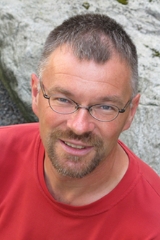
Fritz Schlunegger
is a full professor of exogene geology at the Institute of Geological Sciences at the University of Bern.
To a certain extent, the geologist is also interested in sedimentation processes in Peru as a contrast to the processes at home. “Here, the landscape was completely shaped by the last glaciations, but it’s a little different in the Andes.” The fact that he is currently conducting research in Bern is ultimately also a bit of a coincidence, Schlunegger says: “A position became available at the University of Bern, so I applied.” Schlunegger is quite the mobile researcher, as is now the norm in all disciplines – you always encounter this international outlook when you talk to researchers in Bern about their projects and where they are based, whether in dialect research, geography or public health.
Does science know boundaries?
This high level of mobility and international focus naturally go hand in hand with constant competition for the best minds. This has just been witnessed again in connection with the attacks on American universities and the hopes expressed throughout Europe that one or two of the top minds might perhaps be lured across the Atlantic. Von der Leyen’s statement was less a philosophical reflection on the nature of science than an appeal made at the Sorbonne together with French President Emmanuel Macron: Europe should become a refuge for researchers from all over the world, a political exile for “scientific refugees” as Macron called them. But can there be refugees where there are no passports? Can researchers carry out their work anywhere in the world, with little difference?
Magazine uniFOKUS

A part of Bern
This article first appeared in uniFOKUS, the University of Bern print magazine. Four times a year, uniFOKUS focuses on one specialist area from different points of view. Current focus topic: A part of Bern.
Regional roots as a basis for research
Heike Mayer would definitely want to contradict this. The economic geographer and Vice-Rector of the University of Bern sees regional integration as “very strong and formative”; she definitely draws inspiration from her surroundings – where she lives and works. She also works internationally, for example in a project comparing women as business founders in Switzerland, Colombia and Germany. But she “doesn’t want to bend” to fit in: She cannot carry out fruitful research where she has no background, where she lacks data. She prefers to deal with the question of how Bern can position itself as a capital city region. Or in bachelor’s and master’s projects, she develops ideas on how Thun, Switzerland’s eleventh-largest city, could emerge from the shadow of Bern. Particularly close to her heart, however, are the often somewhat neglected mountain regions, specifically in the Bernese Oberland. For example, she is researching what social innovation can do to combat the shortage of skilled workers – for example, by combining basic medical care with other services.
“Universities need to think about how they can contribute to tackling the major challenges of our time.”
Heike Mayer
Overall, Mayer is convinced that “universities need to think about how they can contribute to tackling the major challenges of our time.” This also requires other approaches. For her, transdisciplinarity is crucial: Research projects should involve local partners as well as the population, which may mean that the research question itself is formulated more openly. What kind of research do we do, what kind of research do we need? This should be discussed much more often together with those affected.
About the person
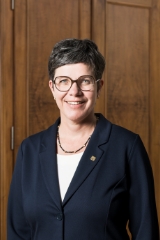
Heike Mayer
is Vice-Rector for Quality and Sustainable Development and Full Professor of Economic Geography at the Institute of Geography at the University of Bern.
The “Engaged UniBE” initiative with the aim of better anchoring the University in society is also the fruit of these considerations. The aim is to support students, teachers and staff in their commitment and exchange with society in order to promote knowledge transfer and develop other forms of knowledge production in general.
Giving something back to the public
Knowledge transfer? Commitment to society? This automatically brings to mind the notorious “tax franc”, the debt owed to the public sector that ultimately pays for the whole setup (further information on this can be found on pages 26 and 27). Linguist and dialect researcher Adrian Leemann does not find it too difficult to prove an economic and social benefit: First of all, of course, it is a question of documenting a cultural asset, one that is more closely linked to identity than almost any other. But he can also enumerate more tangible things: “Our research is also relevant to forensics when it comes to exposing deep-fake voice calls.” These falter over the subtleties of dialect, but to prove this in detail, well-documented foundations are needed. Conversely, chatbot start-ups are also interested in his research. But Leemann doesn’t just focus on the local; he has also studied dialects in England, Germany and Austria. But his main interest is Swiss German. He knows that researchers have different motivations when it comes to “closeness to the people”. “Personally, I find it exciting when it appeals to people and has a specific benefit.”
About the person
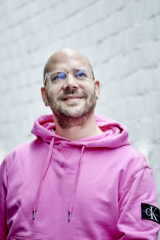
Adrian Leemann
is a full professor at the Institute of Germanic Languages and Literatures of the University of Bern, where he explores language and society, (forensic) phonetics, dialects and innovative linguistic methods.
Local issues – and beyond
Tourism researcher Monika Bandi also sees research as a give and take. This “exchange with stakeholders” is part of her everyday life: “I have to listen to them, otherwise I can’t expect them to listen to us.” On the one hand, her job is to “carry out a lot of interviews” and, on the other, to bring the knowledge back to the region. Similar to Mayer’s demand, she follows a “problem-oriented research approach”: She always tries to find out “what’s really on people’s minds”. But the same applies here: There is no mere navel-gazing; the focus is always on the bigger picture beyond the region. “The international aspect is essential,” says Bandi, although she feels more embedded in a European context because she has her network there. She cites Poland as an example: Tourism development only became possible in the 1990s – a completely different background to Switzerland’s 150-year history of tourism, but that is exactly what makes the collaboration exciting. She came up with a topical research question via media coverage. “You keep reading that Switzerland is in last place globally when it comes to hospitality.” This sparked her curiosity to research the matter: Bandi doesn’t believe that it makes sense to measure this with random samples. “Online reviews on Google or Tripadvisor are definitely more appropriate.” In this way, she sets out to examine the myth of the particularly unfriendly host country (which is familiar in various forms to almost every tourist region) and, depending on the results, to develop improvement measures together with the destinations.
About the person
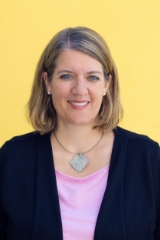
Monika Bandi
is head of the Tourism Research Unit (CRED-T) at the Center for Regional Economic Development (CRED) at the University of Bern.
Committed to the world
An undisputed Swiss exclusivity, on the other hand, is the “very high value of dialect”; in this respect, Leemann’s decision to focus on the local is also understandable. With Gen Z, the trend is actually even more towards the dialect. Today, it is quite normal for young people to write their diaries in dialect: Spoken language is written down in this way. At the same time, there is a Germanization in the vocabulary – more and more people are using the German word for butterfly, “Schmetterling,” for example instead of the Swiss German word“Pfiffoltera”. Whether these developments are good or bad is of less interest: “It’s not our job as linguiststo evaluate language change: We watch what happens.” In this respect, research is always carried out “for the larger research community”: The precise observation of a microcosm is reflected in the wide world.
Subscribe to the uniAKTUELL newsletter

Discover stories about the research at the University of Bern and the people behind it.
The founding father of the Swiss National Science Foundation (SNSF), Bernese physiology professor Alexander von Muralt, would have signed this without reservation. Interestingly enough, the activities of the National Science Foundation, which was founded in 1952, were not only to benefit Switzerland. The country had been spared the war, which is why the founders of the SNSF considered it an obligation to the world, and especially to Europe, to promote research and thus to contribute to reconstruction. So there, too: microcosms and wide worlds.
Better prepared for the next pandemic thanks to local sourcing
Perhaps the most striking local-global balancing act can be found in the “BEready” project at the Multidisciplinary Center for Infectious Diseases (MCID). The project came about thanks to a substantial financial injection from the Biel-based Vinetum Foundation, which initially meant “complete freedom” in the design of the project, says project leader Nicola Low. While the coronavirus pandemic was still in full swing, the foundation approached the University with the motivation to improve research on infectious diseases. Complete freedom, but here too it quickly became clear: Local sourcing would be central. Low: “It was important to us to be anchored in the Canton of Bern and get to know our people better.” And project manager Eva Maria Hodel adds that her research motivation is directly linked to this direct feedback; this may also have to do with the fact that she was originally a pharmacist. “I’m not so enthusiastic about ivory research, so I guess I ended up in epidemiology and not in the lab.” She says she wants to do socially relevant research. Together with people for people.
“After all, it’s also about trust, it’s about building a long-term relationship.”
Eva Maria Hodel
So the team is now building up a Bernese cohort, a medical microcosm so to speak, including entire households, even pets. “If we want to monitor the transmission pathways of infectious diseases, a local cohort study with entire households makes sense, as it better reflects real contact structures than in a scattered sample.” The local presence is also extremely helpful when it comes to recruitment, says Hodel: You don’t have to convince the participants to do “something” for “some international initiative” – “we are in direct dialog with people, after all, it’s also about trust, it’s about building a long-term relationship.”
About the person
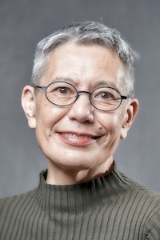
Nicola Low
is Professor of Epidemiology and Public Health at the Institute of Social and Preventive Medicine (ISPM) and head of the "BEready" project at the Multidisciplinary Center for Infectious Diseases (MCID) at the University of Bern.
Although, of course, we have been reminded, especially in the case of Covid, that viruses are not regionally oriented at all and know no cantonal or national borders. Of course, they are well networked internationally, agrees Low. Here, too, you can learn from the small for the big: “In demographic terms, Bern presents a good picture for the whole of Switzerland.” During the pandemic, there was an urgent need for the kind of data that will hopefully be gathered with BEready: “For example, we lacked information on social contacts between different age groups,” says Hodel. This had a direct impact, for example on school closures: Were they really needed? To answer this, they used data from abroad and used modeling to understand the local conditions, but the knowledge remained very patchy. “This is exactly the kind of data we collect at BEready,” says Low.
About the person
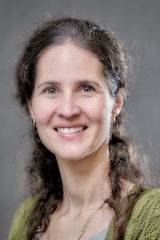
Eva Maria Hodel
is manager of the "BEready" project at the Multidisciplinary Center for Infectious Diseases (MCID) at the University of Bern.
Maintaining independence
Leemann also describes how “unbelievably close” his research is to people, he calls it a “privilege” to have such an object of investigation, and he is constantly invited to events by dialect associations, for example. He believes that, in view of global challenges such as the climate crisis and Ukraine, it makes sense for researchers to occasionally reflect on the extent to which a purely academic withdrawal is still appropriate. Heike Mayer also feels driven by the aspiration to “solve the problems of our time”. However, she points out that dialog with local interest groups always entails the risk of being pigeonholed into a particular political camp. The independence of research must always be defended. After all, it is precisely the involvement in specific, locally anchored projects that make it clear that neutrality in its most comfortable, even in its most naive form can only exist in the ivory tower. “As a researcher you have a position of power,” says Mayer, “and you always have to be aware of this.”
ABOUT THE INSTITUTE FOR LEGAL ITALIAN LANGUAGE AT THE UNIVERSITY OF BERN
The Istituto di italiano giuridico at the University of Bern (Institute for Italian Legal Language) is the first university center dedicated to the enhancement and promotion of and research into Italian legal language. As Italian is one of the official languages of Switzerland, standard legal texts such as laws and ordinances, procedural texts such as judgments, and administrative texts such as decrees are also written in Italian. Interpretive texts such as monographs, com-mentaries, and scientific articles are also formulated in Italian. The new institute of the Univer-sity of Bern was founded in the city that houses the Federal Assembly of the Swiss Confedera-tion and the Federal Council, and therefore maintains direct relations and close collabora-tions with the Federal Chancellery, Legislation and Language Section, and the State Council of the Canton of Ticino

